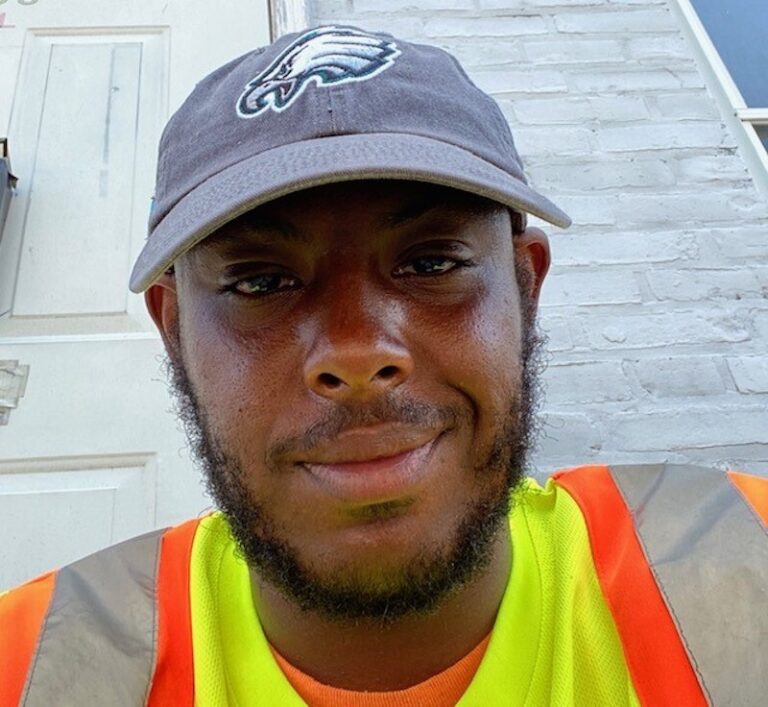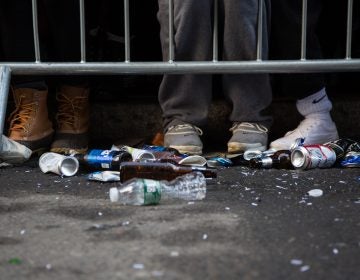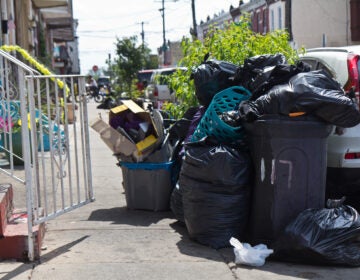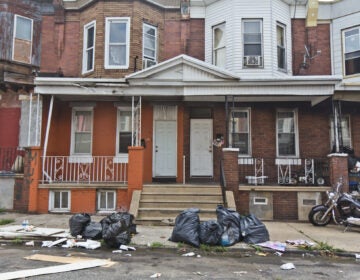Meet the ‘trash man’ working to solve Philly’s sanitation woes with PPE and Instagram
Terrill Haigler always wanted to be a Philly trashman. Now, the sanitation worker is helping his colleagues, and helping others understand the grueling job.

Terrill Haigler aka @_yafavtrashman smiles during a shift as a city sanitation worker. (Courtesy of Terrill Haigler)
Are you on the front lines of the coronavirus? Help us report on the pandemic.
Terrill Haigler aka @_yafavtrashman always wanted to be a Philadelphia trashman.
He applied for the job two years ago, excited for the benefits that a city job could bring. He didn’t yet know how grueling the job would be. That changed seven months ago when he stepped aboard the city Sanitation Division’s large white trucks and began picking up the garbage of his native North Philadelphia.
“This has been one of the hardest jobs I’ve ever done in my life, consistently,” Haigler said.
Haigler has worked tough jobs, including construction, to feed his three kids. But working as a city sanitation worker has been the most humbling — and insight-generating— occupation of his 30 years. Last week, he worked for 13 days straight, from 7 a.m. to 7 p.m.
“It’s just the beat that your body takes, the mental, the emotions, the elements you deal with, the rain… And, you know, sometimes you gotta deal with the public who aren’t happy with their trash and everything,” Haigler said.
Philadelphia residents have not lately been happy with their trash collection — or lack thereof. Although the Sanitation Division of the city’s Streets Department has slowly caught up on collection, the city is still behind on trash pickup days. In some areas, the city suspended recycling. The result: an extended banquet for rodents and flies, and smelly sidewalks blocked with trash bags and cans for wheelchair-users and pedestrians to navigate under the oppressive heat. Rubbish and recycling 311 complaints are still twice the amount of those received pre-COVID.
Mayor Jim Kenney has blamed the weather, while Streets Commissioner Carlton Williams says delays are caused by a 25% increase in trash tonnage and a staff shortage of caused by the pandemic. Meanwhile, the union representing 1,100 sanitation workers said those are excuses for mismanagement and lack of leadership.
Haigler said all of those are true. The collection is bound to be delayed if 10% of your workforce is out fighting COVID, he said. But instead of blaming everyone, he wanted to focus on a solution and started a fundraiser effort to get N95 masks, gloves, and cleaning supplies for sanitation workers.
The city has given sanitation workers masks and gloves, Haigler said, but not the proper ones for their job. He said picking up trash with the big plastic face shield he got is impossible. And that the gloves he got are not puncture-proof, so they don’t protect from needles, nails and other hazards. He wants to help solve the problem by raising money for more gear.
By Wednesday morning, Haigler had reached one-fourth of his goal: to sell 2,000 T-shirts, enough to help his colleagues stay safe until next winter.
“I just want to bring awareness to the fact that we are left out of the top when it comes to being essential. So, you know, I really don’t get it whose fault it is — I just deal with how can we come together, get what we need, and keep the city in a constant flow of picking the trash up.”
Street cleaning problems that predate the pandemic
Union representatives from AFSCME District Council 33 are not alone when saying the weather, increased trash tonnage, and COVID are not the only factors contributing to the current trash crisis.
Nic Esposito, the city’s former Zero Waste and Litter cabinet director, said our sanitation system was broken long before COVID. That’s why the city created his former office four years ago.
The pandemic just made the cracks give and everything collapsed, including his office, which was dismantled to make up with the city’s reduced budget.
Esposito said the city has the initiatives and the capacity to plan and manage situations like this better, but said there’s a lack of political will and further resources to implement them. He said his office, for example, was set to failure because it didn’t have the funds or the political power to implement solutions to actually reduce waste and litter in the city.
Other solutions, like hiring temporary workers to support staff in times of higher demand or using technology to improve collection, were available, but not implemented.
“The proof is out there — it’s undeniable that there is a problem. And I think that the administration, they have to look to leadership and just really hold them accountable and ask why? Why is this happening?,” he said.
Before leaving his office, three months ago, Esposito compiled waste management best practices during COVID and sent them to Streets Commissioner Williams.
PlanPhilly got access to the document with 12 recommendations which include wearing all personal protective gear including gloves, masks and protective eye equipment and hand sanitizer; washing the cabin of the trucks after every shift; suspending recycling temporarily and asking residents to use two bags in everything they’re throwing away; and promoting ways for people to reduce waste as much as possible.
Commissioner Williams said in an interview he did not receive the document but an email sent from his account to the senders acknowledges “the background” information. More generally though, Carlton said the department already has in place some of these recommended practices. The Streets Department requires employees to use PPE, sanitizes truck cabins after every shift, and take other precautionary measures, he said.
“The health and safety of our employees are our number one priority,” Williams said.
Williams said the department has purchased and distributed thousands of masks, gloves, face shields, sanitary equipment and hand sanitizer for its employees since the beginning of the pandemic, in March. Furthermore, the commissioner said PPE was distributed to workers even before the pandemic.
“It may not have been to the extent of what the union was asking, but it was to the extent that we thought it was protective for our employees while they were doing their jobs and within budget constraints that we have within the city of Philadelphia,” he said.
Sanitation workers have been demanding PPE since April, relying on donations to purchase N95 masks. Williams said to address what he calls a miscommunication, the department is now asking workers to sign for every piece of equipment they receive.
Demands for hazard pay won’t be met at this moment, Williams said, because of budget restraints. Streets had a $18.7 million cut to its budget, which ended up being around $148 million, with a budget for sanitation of about $90 million, he said.
Meanwhile, other costs are piling up. Wednesday, the Kenney administration presented City Council with a plan to hire 120 temporary sanitation workers to address the widespread delays in pickup. The temporary hires will cost $2 million, money that the city hopes to get back in federal reimbursements for disaster costs, city spokesperson Kelly Cofrancisco told the Inquirer.
‘We are human beings too’
Joshua Kelaher moved back to Philadelphia last February, after moving in and out of the area for a bit. At first, he was impressed by the city’s sense of community and the level of civic engagement. But very quickly he realized litter and trash collection was a big problem.
An engineer with no waste management background, he decided to analyze the city’s system to find how it could be improved and started a petition asking Mayor Kenney to improve the city’s sanitation services in the city two weeks ago. Over 1,300 people have signed it so far.
The first step, he said, is to improve compensation or benefits for sanitation workers to show their service is essential.

Subscribe to PlanPhilly
The average sanitation worker salary is $32,000 a year, without overtime, which is paid time and a half.
“A lot of people were frustrated and blamed those who are visible, sanitation workers, but after doing some digging through the city’s budget and [news] articles I learned that a lot of the issues come from mismanagement,” he said.
The petition includes 11 recommendations which include hiring more workers, adding more trucks and implementing a process to manage resources depending on the needs. Other solutions are to add more public trash cans, expand composting programs, and have trash and recycling consolidation points.
Commissioner Williams said the department is looking at some of the ideas. They’re trying to hire additional people, including the temporary workers, to cope with the increased trash volume. And that they’re launching a new program called “curb your waste” with tips everyone can implement to reduce their waste during the pandemic such as composting, using a garbage disposal, or taking trash to one of the six sanitation convenience centers.
“Those are some of the small things that each and every resident can do to help the department manage in this crisis to reduce the waste, reduce the delays, and certainly get us back into a normal collection schedule,” Williams said.
Haigler said he really hopes, somehow, the system gets fixed and things get better for him and his coworkers.
He said he understands people being frustrated with trash being left in the ground for days, but said they’re doing their best.
“So [when] someone is like ‘Hey, why are you guys so behind?’ I’m like ‘Hey, we are human beings too. Some of us are affected by COVID, some of us are tired, some of our bodies are breaking down, some of us just need a personal day to kind of recoup from working 14 days straight, you know? Our health is still at risk,” he said.
Haigler’s goal for his Instagram account goes deeper than raising money for masks. He wants people to have an inside look at the life of a trashman.
“Then maybe when they come outside, instead of, you know, being upset and frustrated, they can just say ‘thank you,’ ‘here’s a water’, ‘we appreciate you,’ ‘is there anything else I could do?’”
 WHYY is among more than 20 news organizations producing Broke in Philly, a collaborative reporting project on solutions to poverty and the city’s push towards economic justice. Follow us at @BrokeInPhilly
WHYY is among more than 20 news organizations producing Broke in Philly, a collaborative reporting project on solutions to poverty and the city’s push towards economic justice. Follow us at @BrokeInPhilly
WHYY is your source for fact-based, in-depth journalism and information. As a nonprofit organization, we rely on financial support from readers like you. Please give today.




![CoronavirusPandemic_1024x512[1]](https://whyy.org/wp-content/uploads/2020/03/CoronavirusPandemic_1024x5121-300x150.jpg)



